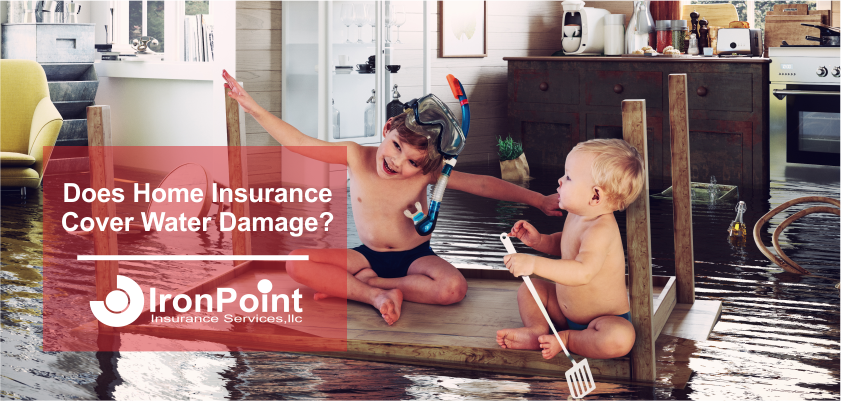Home Insurance and Water Damage: What’s Covered, What’s Not, and Why Your Basement Might Become an Indoor Pool

Water damage can turn your dream home into a nightmare—fast. It’s destructive, disruptive, and expensive. But when it comes to insurance coverage, the waters can get murky.
Your policy isn’t as waterproof as you think.
Imagine this: It’s 2 AM. You’re awakened by an ominous sound—somewhere between a gurgle and a roar. You stumble downstairs to discover water gushing from beneath your kitchen sink, already ankle-deep across your beautiful hardwood floors. As you frantically search for the shut-off valve, one terrifying question flashes through your mind: “Is this covered by my insurance?”
The answer? Good news, this scenario is typically covered.
But here’s the problem. Water damage isn’t always simple with home insurance.
It accounts for nearly 24% of all homeowners insurance claims, with an average cost of $10,849 per incident. Yet most policies have specific rules about which water damage they’ll cover and which they won’t.
Let’s fix that today.
Your protection depends entirely on where the water comes from, how it enters your home, and whether you could have prevented it. One inch of difference can determine whether you’re fully covered or completely soaked with expenses.
The Real Cost of Water Damage—and What Insurance Actually Covers
Here’s a cold, hard fact: not all water damage is created equal in the eyes of your insurance company. That burst pipe in your kitchen? Probably covered. The rising floodwaters from that creek behind your house? Not so much.
The difference could cost you thousands, or even tens of thousands of dollars. And yet, most homeowners don’t discover these crucial distinctions until they’re standing ankle-deep in their living rooms, smartphone in hand, frantically Googling “does home insurance cover water damage?”
Let’s dry out the confusion once and for all.
The General Rule: Where the Water Comes From Matters
Your standard home insurance policy follows a surprisingly simple principle when it comes to water damage:
If it comes from above or within, you’re likely covered. If it comes from below or outside, you’re probably out of luck.
Simple, right? Well, not quite. The devil, as they say, is in the details (or in this case, in the fine print of your policy).
Water Damage Your Insurance WILL Cover
1. Sudden and Accidental Incidents
When water damage is sudden, unexpected, and comes from within your home, your policy typically has your back. This includes:
- Burst pipes: That copper pipe that suddenly split during a cold snap? Covered.
- Accidental overflows: When your bathtub runneth over because someone answered the door and forgot about it? Generally covered.
- Appliance malfunctions: The dishwasher that decided to flood your kitchen? The water damage (though not the appliance itself) is typically covered.
- Water damage from putting out a fire: If firefighters hose down your home to extinguish flames, that water damage is usually covered.
- Roof leaks from storms: When rain gets in through a storm-damaged roof, you’re typically protected.
2. The Hidden Benefit: Additional Living Expenses
If water damage makes your home temporarily uninhabitable, many policies will pay for hotel stays, restaurant meals, and other necessary expenses while repairs are underway. This often-overlooked benefit can be a financial lifesaver during a crisis.
Water Damage Your Insurance WON’T Cover
Here’s where homeowners often get soaked with unexpected expenses:
1. The Dreaded “F” Word: Flooding
Standard home insurance policies explicitly exclude damage from flooding, defined as water that comes from outside your home. This includes:
- Rising water from heavy rains
- Overflowing rivers, lakes, or oceans
- Storm surges
- Groundwater seeping up into your basement
For this protection, you’ll need a separate flood insurance policy through the National Flood Insurance Program (NFIP) or a private insurer.
2. Sewer Backups and Sump Pump Failures
When wastewater decides to flow the wrong way, your standard policy likely won’t help unless you’ve added specific endorsements. Same goes for when your sump pump gives up the ghost during heavy rains.
3. The “You Should Have Known Better” Exclusion
Insurance companies expect you to take reasonable care of your home. This means:
- Gradual leaks: That small drip under the sink that you ignored for months? Not covered.
- Neglected maintenance: The roof you knew needed replacing five years ago? Your claim may be denied.
- Preventable frozen pipe damage: If you left for winter vacation and turned off all the heat, resulting in frozen and burst pipes, you might be on your own.
The Water Damage Coverage Comparison Chart
Scenario | Is It Covered? | What You Need |
Sudden pipe burst | ✓ YES | Standard homeowners |
Appliance overflow | ✓ YES | Standard homeowners |
Storm damage to roof causing leaks | ✓ YES | Standard homeowners |
Fire hose water damage | ✓ YES | Standard homeowners |
Flood from heavy rain or rising water bodies | ✗ NO | Separate flood insurance |
Gradual leaks | ✗ NO | None – maintenance issue |
Sewer backup | ✗ NO* | Standard + backup endorsement |
Sump pump failure | ✗ NO* | Standard + sump pump endorsement |
Broken appliance replacement | ✗ NO | Appliance warranty or replacement cost |
*Unless you have the specific endorsement
Water Damage Insurance Endorsements Worth Every Penny
Smart homeowners boost their protection with these crucial add-ons:
1. Water Backup Coverage
For a modest premium increase (typically $25-$50 annually), this endorsement covers damage from backed-up sewers and drains. Considering the average sewer backup claim runs $10,000-$20,000, this is an easy decision.
Consider this story from an insured in Cleveland. This policyholder learned this lesson the hard way. After heavy spring rains, sewage backed up into his finished basement, causing $14,000 in damage. Without the proper endorsement, his standard home insurance covered exactly $0. “For what would have been less than $5 a month, I could have avoided paying thousands out of pocket,” he warns.
2. Sump Pump Failure Coverage
If your basement has a sump pump, this endorsement is non-negotiable. It covers damages if your pump fails due to power outages, mechanical breakdowns, or simply being overwhelmed by too much water.
3. Service Line Coverage
This newer endorsement covers repair or replacement of water, sewer, and other utility lines between your house and the street – repairs that can cost thousands and aren’t typically covered by standard policies or even by your utility company.
When Disaster Strikes: Your Water Damage Response Plan
When you discover water damage, time is quite literally money. Here’s your action plan:
- Stop the Water (If Possible)
- Know where your main water shut-off valve is located before disaster strikes
- Turn off electricity to affected areas (but only if safe to do so)
- If the source is a specific appliance, turn off its dedicated water valve
- Document Everything
- Stop the Water (If Possible)
Before you touch anything:
- Take photos and videos of all damaged areas
- Capture the source of the water if apparent
- Document the water level at its highest point
- Photograph all affected belongings
- Begin Mitigation (But Keep Evidence)
Insurance requires you to prevent further damage, but not at the expense of evidence:
- Remove standing water if safe to do so
- Move undamaged items to dry areas
- Use fans and dehumidifiers if available
- But DON’T discard damaged items until the adjuster has seen them
- Contact Your Insurance Company Immediately
Most policies require prompt notification – typically within 24-48 hours. Have ready:
- Your policy number
- Date and time of discovery
- Suspected cause
- Description of damage
- Your documentation photos/videos
- Keep Detailed Records
Throughout the claims process:
- Log all communications with your insurer
- Save all receipts for emergency repairs and replacement items
- Document additional damage that appears during cleanup
Water Damage Prevention: Your Best Defense
An ounce of prevention is worth a gallon of cure when it comes to water damage:
- Regular Maintenance Checks
- Inspect appliance hoses annually and replace them every 5-7 years
- Check your water heater for signs of corrosion or leaks
- Have your HVAC system serviced regularly, including condensation lines
- Clean gutters and downspouts at least twice a year
- Smart Home Water Monitoring
- Regular Maintenance Checks
New technology can detect leaks before they become disasters:
- Whole-home water shut-off systems can detect abnormal water flow and automatically shut off your water
- Individual leak sensors placed near appliances, toilets, and sinks can alert you via smartphone
- Many insurance companies now offer homeowners insurance discounts for these systems
- Winter Freeze Prevention
- Insulate pipes in unheated areas
- Keep your home heated to at least 55°F during cold weather, even when you’re away
- Allow faucets to drip during extreme cold
- Open cabinet doors to allow warm air to circulate around pipes
The Bottom Line: Knowledge Is Your Best Defense
Water damage claims average $10,000-$15,000, making them among the most common and costly home insurance claims. Yet with proper understanding of your home insurance coverage, appropriate policy endorsements, and preventive measures, you can significantly reduce both your risk and your out-of-pocket expenses.
Don’t wait until water is seeping through your floorboards to understand your coverage. Review your policy today, consider those critical endorsements, and implement a prevention plan that keeps your home—and your bank account—high and dry.
The Choice Is Clear: Preparation Beats Desperation
When it comes to water damage, hope is not a strategy. Neither is crossing your fingers and assuming your insurance policy will cover whatever Mother Nature or your aging plumbing decides to throw at you.
The smart play? Know your coverage before you need it. Add those critical endorsements before water starts seeping through your ceiling. Install those preventive measures before your basement becomes an impromptu swimming pool.
Because here’s the uncomfortable truth: when it comes to water damage, it’s not a matter of if, but when. The average home has a 98% chance of experiencing water damage during the lifetime of a 30-year mortgage.
So take action today. Call your insurance agent and review your home insurance policy. Invest in those simple preventive measures. Because when water damage strikes—and it will—the difference between a minor inconvenience and a financial catastrophe often comes down to one thing: preparation.
Your future self, standing dry amid the chaos while your neighbors wring out their possessions, will thank you.
This article provides general information about water damage and insurance coverage but is not a substitute for reviewing your specific policy. Coverage varies by insurer and policy type. For the most accurate information about your coverage, consult your policy documents or speak directly with your insurance representative.
Let’s Get Started
Select the way you want to start your quote.
Let’s Get In Touch
Compare Quote Online
Let’s Get Started

Want to know if you can save on home or auto insurance? See for yourself. Start a quote today.
Call today and speak with a professional insurance agent.
1-877-334-7646






